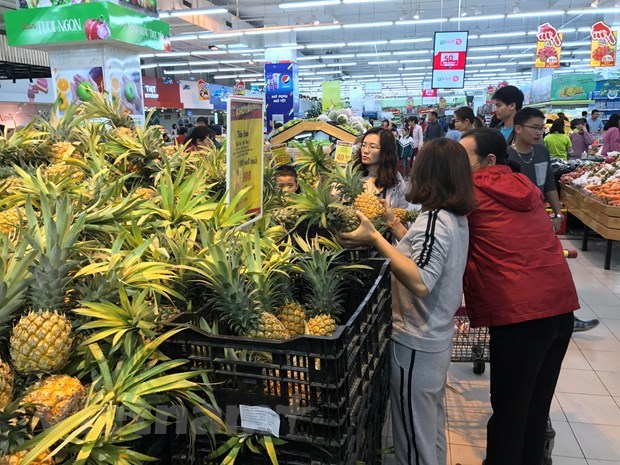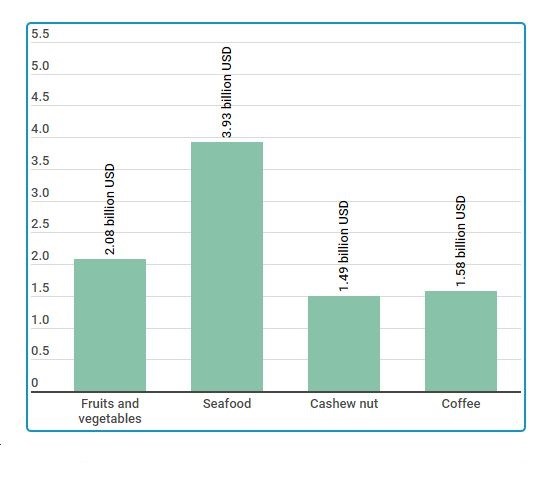Agricultural products need improvements to better compete in EU market
Hanoi (VNA) – The EU-Vietnam Free Trade Agreement (EVFTA) is seen as a comprehensive and high-quality trade pact that helps diversify export markets for products originating from Vietnam, particularly agricultural products and seafood. However, exporters should work to ensure their goods can reach these fastidious markets with strict standards for imports.
According to insiders, Vietnamese husbandry will be greatly impacted due to small-scale farming, less competitive prices and failure to meet food safety and hygiene criteria.
 Vietnam is among the world’s top exporters of many agricultural products(Photo: VietnamPlus)
Vietnam is among the world’s top exporters of many agricultural products(Photo: VietnamPlus)
Prices of agricultural products still unstable
Vietnamese agricultural products have won many consumers worldwide. The country is the world’s second largest rice exporter and has been among the world’s top pepper and cashew shippers for years.
The country’s farm produce and seafood products have been shipped to 190 countries and territories.
Currently, the EU is the second biggest consumer of Vietnamese agricultural products, with 15.4 percent of the country’s total exports, compared to 13.8 percent to the US in third.
However, the value of agro-forestry-fishery exports has varied enormously in recent years, according to the Ministry of Agriculture and Rural Development. In the first six months of the year, export revenue fell 6.9 percent year-on-year to estimated 12.4 billion USD.
Dramatic drops were seen in coffee (10.6 percent in volume, and 21.1 percent in revenue), rice (2.9 percent in volume, and 17.6 percent in value), and cassava (17.7 percent in volume, and 13.9 percent in value).
Chairman of the Vietnam Farmers’ Union Thao Xuan Sung pointed out a lack of agricultural value chains as well as high rate of unprocessed exports as the main weakness of the sector.
“Those factors have put up barriers for Vietnamese products on the way to global markets, particularly large and high-quality ones,” Sung said.
Agricultural products and seafood have been returned or faced increased inspection frequency due to failure to meet Sanitary and Phytosanitary Measures (SPS) and Technical Barriers to Trade (TBT) requirements in choosy markets like the EU.
With the EVFTA, Deputy Head of the Ministry of Agriculture and Rural Development’s Institute of Policy and Strategy for Agriculture and Rural Development Tran Cong Thang said: “Although a line-up of tax lines will be removed under the EVFTA, the trade pact holds stricter regulations on food safety and traceability.”

Exports of seafood and some agricultural products in first half of 2019 (Photo: VietnamPlus)
Farmers not left behind
Once the EVFTA takes effect, tariffs imposed on Vietnamese agricultural exports, including processed goods, will be reduced or even removed.
Specifically, the EU will eliminate 94 percent of the total 547 tariff lines on vegetable and fruit products, many of which are Vietnam’s strengths, including litchi, longan, rambutan, dragron fruit, pineapple, and melon. Currently, Vietnamese fruits and vegetables face the most favoured nation (MFN) tax of up to 20 percent.
However, thanks to the deal, EU farm produce will also be able to reach the Vietnamese market, threatening local products’ market share.
Experts have said the agricultural sector should be reorganised towards competitiveness to take full advantage of the trade pact.
According to Chairman of Thai Binh Seed Joint Stock Company Tran Manh Bao, processing and preserving systems must be developed to meet strict technical and food safety and hygiene standards of importers.
The State, businesses and farmers should work together to create a complete value chain, helping improve competitive edge globally.
“The Government should join hands with companies to build strong national brands,” he recommended.
Meanwhile, PhD. Nguyen Minh Phong suggested the agricultural sector shift towards a cooperative economic model to adapt to global economic integration.
“The State needs to improve planning quality, give better forecast of the global farm produce market as well as accelerate automation and mechanisation in the whole production process,” he said.
Vice President of Vietnam Farmers’ Union Nguyen Xuan Dinh stressed that the household business model should receive due attention from the State. Rational mechanisms must be mapped out to develop new-style cooperatives, as well as encourage the participation of local farmers.
These factors, when brought together, are prerequisites for agricultural development. Particularly, they help ensure no farmers are left behind during the integration process.-VNA













